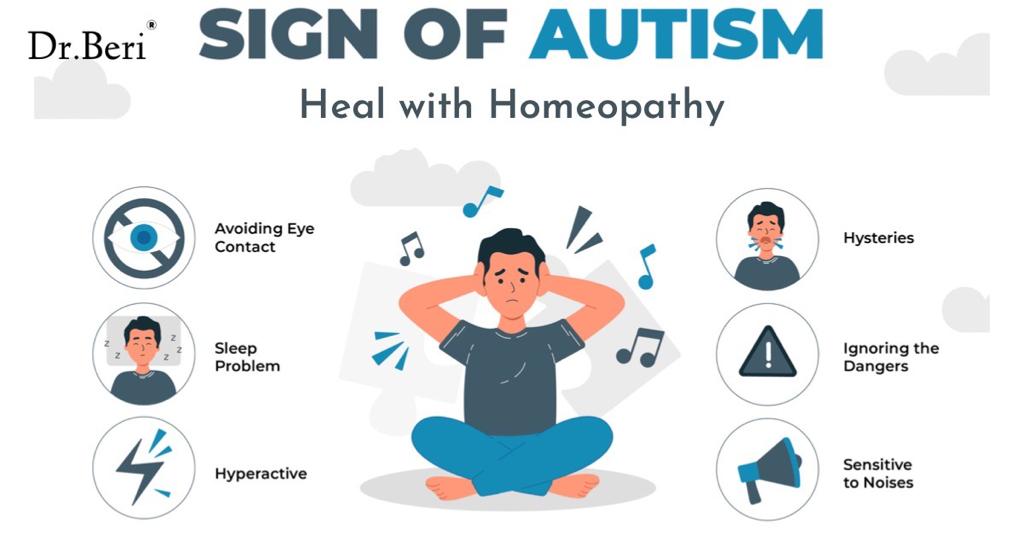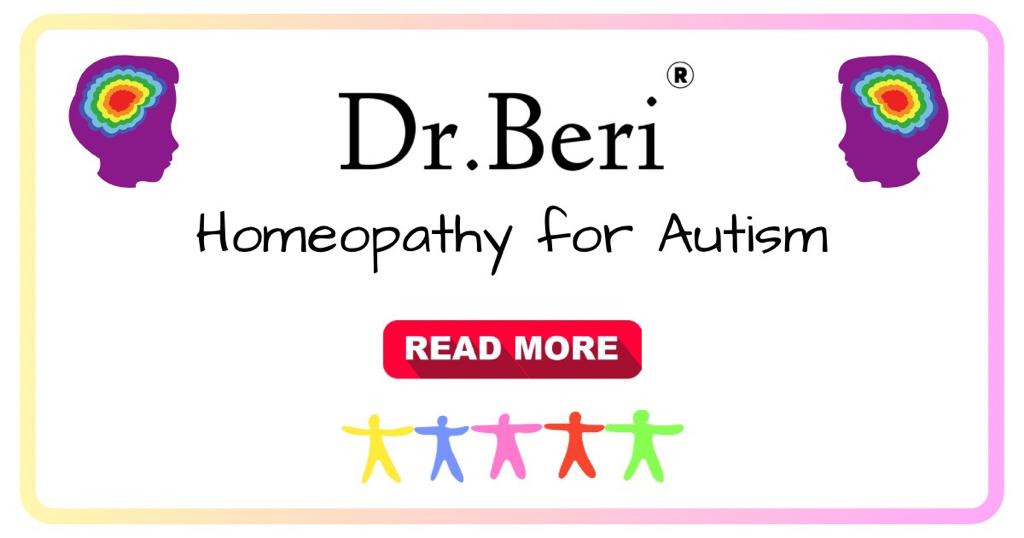Last updated: Oct 2, 2025
Autism Spectrum Disorder (ASD) is a complex neurodevelopmental condition that affects communication, social interaction, and behavior. Every child on the spectrum is unique, and while conventional therapies like speech therapy, play therapy, and applied behavior analysis (ABA) are essential, many parents also explore supportive natural care options.
Homeopathy for autism is gaining attention because of its holistic, gentle, and individualized approach. Unlike one-size-fits-all medicines, homeopathy focuses on the personality, emotions, and behavior of the child along with physical health. This makes it especially valuable in conditions like autism where symptoms and severity vary widely.
In this article, we will explore the best homeopathic medicines for autism, providing effective treatment options. By taking a holistic approach, homeopathy offers promising solutions that address the unique needs of individuals with autism, providing hope for improved quality of life.
Let’s explore the best homeopathic medicines and treatment options available for those seeking alternative approaches to autism care.
What is Autism Spectrum Disorder?
Autism Spectrum Disorder (ASD) is a developmental condition usually identified in early childhood, often between ages 2–3. It affects how individuals perceive the world, interact with others, and express themselves.
Types of Autism Spectrum Disorders include:
- Classic Autism: This is the type of autism that most people think of when they hear the term. It involves significant challenges with language, communication, and social skills. Milestones, such as speech development, may be delayed, but many individuals with classic autism have normal intelligence.
- Asperger Syndrome: Asperger Syndrome is a milder form of autism. The main difference between Asperger Syndrome and classic autism is that individuals with Asperger Syndrome typically have normal language and cognitive abilities. However, they still experience significant difficulties in social interaction and non-verbal communication.
- Pervasive Developmental Disorder-Not Otherwise Specified (PDD-NOS): This is sometimes called “Atypical Autism” and is diagnosed when someone doesn’t fit neatly into the categories of classic autism or Asperger Syndrome.
Signs & Symptoms of Autism in Children

Parents should look for early red flags that may suggest autism.
Common signs include:
- Lack of Smiling: Not responding with a smile to joyful expressions by 6 months of age or later.
- Limited Facial Expressions: Absence of facial expressions by 9 months, such as not showing emotions through facial movements.
- Delayed Babbling: Not engaging in babbling sounds by 12 months, which are the early vocalizations babies typically make.
- Lack of Gestures: Not pointing, showing, reaching for objects, or waving by 12 months, which are important non-verbal communication skills.
- Delayed Speech: No meaningful words spoken by 16 months, indicating a delay in expressive language development.
- Lack of Phrases: Inability to speak meaningful, two-word phrases (excluding imitating or repeating) by 24 months.
- Regression: Any sudden loss of previously acquired speech, babbling, or social skills at any age, which is a significant change in development.
These signs may serve as red flags for potential autism-related concerns. If you notice these behaviors in a child, it is advisable to consult with Dr Beri for further evaluation and guidance. Early identification and intervention can make a positive difference in the lives of individuals with autism.
Not sure which symptoms and signs for autism fits your child’s needs? Get a personalized homeopathy plan.
How to Support a Child with Autism
Autism care is multi-dimensional. Homeopathy works best alongside supportive therapies that nurture development.
Play Therapy
Play therapy is a powerful approach that harnesses the natural process of play to facilitate learning and growth. For children with autism, who may tend to play alone and engage in repetitive behaviors, play therapy offers a valuable opportunity to develop social interaction and communication skills.
The primary aim of play therapy is to support children in expanding their ability to engage in imaginative and creative play. By encouraging novel activities and fostering symbolic play, therapists help children with autism broaden their repertoire of play behaviors. Through playful interactions, children can develop and refine their social and communication skills in a safe and supportive environment.
Speech Therapy
For children with autism who experience challenges with speech and language skills, speech therapy offers a vital pathway to enhance their ability to communicate effectively. While speech therapy encompasses a broad range of techniques and interventions, there are aspects of it that parents can incorporate with relative ease and minimal training.
The primary objective of speech therapy is to support children in developing their speaking skills, as well as enhancing nonverbal communication abilities. Speech therapists work closely with children to improve their articulation, pronunciation, and overall verbal expression. Additionally, they focus on augmentative and alternative communication methods, including signs, gestures, picture systems, or electronic devices that facilitate communication.
Applied Behavior Analysis (ABA)
Applied Behavior Analysis (ABA) is widely recognized as a highly effective therapy for autism. With specific and measurable goals, ABA therapists excel in teaching new skills. While formal training is available, you can also apply ABA techniques in your home with some basic understanding.
Here’s a simplified approach to using Applied Behavior Analysis (ABA) principles:
- Choose a skill you want to teach (e.g., brushing teeth).
- Break the skill into small, manageable steps (e.g., find toothbrush, wet it).
- Show the first step to your child, providing hands-on guidance if needed. Once they understand, ask them to do it independently.
- Praise and reward your child for their effort, using a small treat as motivation. If they don’t comply, ask again and repeat the training if necessary.
- Once your child masters the first step, move on to the next step.
- If your child needs help connecting the steps (chaining), provide a visual aid, such as a chart with the sequential steps.
By applying these straightforward principles, you can incorporate Applied Behavior Analysis (ABA) techniques to teach new skills and promote positive behavior. Remember, consistency and repetition are key to reinforcement learning and helping your child succeed.
Parental Role
- Patience and acceptance
- Providing a safe environment
- Managing screen exposure
- Handling challenging behaviors with calm guidance
Related read: Homeopathy for ADHD and behavioral support
Role of Homeopathy in Autism Treatment
Homeopathy for autism focuses on the whole child emotional, mental, and physical aspects rather than isolated symptoms. Remedies are prescribed based on constitution, behavior, triggers, and personality traits.
Key benefits:
- Gentle and non-toxic
- Addresses hyperactivity, speech delay, sleep issues, tantrums, or behavioral rigidity
- Can be safely combined with therapies like speech or play therapy
- Aims to improve overall quality of life and development
Note: Homeopathy does not “cure” autism but may support children by reducing symptom intensity and improving adaptability.
Best Homeopathic Medicines for Autism
Different children present different challenges.
Here are some well-known remedies in autism care used by homeopaths based on symptom clusters:
1. Carcinosin – For Stubborn & Rigid Behavior
- Suited for children with obsessive habits, compulsive actions, and stubbornness
- Helpful when the child is intelligent yet rigid, with disturbed sleep patterns
- Sometimes indicated in children with talents but difficulty adjusting socially
2. Agaricus – For Lack of Empathy & Unusual Reactions
- Useful in children who appear indifferent or unresponsive to emotional cues
- Exhibits muttering, shouting, or singing without context
- May help when involuntary jerking or awkward physical movements are present
3. Baryta Carbonica – For Speech Delay & Low IQ
- Indicated in children with slow learning, weak memory, and delayed milestones
- Helps with shyness, hiding behind parents, and poor confidence
- Especially relevant in autism with speech delay (a top concern for parents)
- Also supports children with stunted growth and frequent tonsillitis
4. Tarentula – For Hyperactivity & Restlessness
- Effective in autism cases with extreme restlessness and destructive behaviors
- Children may have sudden mood swings, dislike company, and crave music or dance
- Constant need to move, fidget, or run
Additional Remedies Sometimes Considered
- Stramonium: For violent tantrums and fearfulness
- Tuberculinum: For destructive tendencies and mood instability
Looking for the Best Homeopathic Treatment for Autism?
Don’t just manage symptoms—address the root cause naturally. Our expert team provides personalized homeopathic remedies for autism to support long-term progress.
- Evidence-based individualized care
- Gentle, side-effect–free medicines
- Convenient online autism homeopathy consultation
Prefer a quick call? +91 8602000033
Classical Homeopathy for Autism
Some families prefer a classical homeopathy approach, where one deep-acting constitutional medicine is given instead of multiple remedies.
This is especially relevant when:
- Autism symptoms overlap with family history of psychiatric or developmental conditions
- Child’s personality and temperament clearly point to one remedy
- Long-term, holistic improvement is the focus
Can Homeopathy Cure Autism?
This is a common question parents ask. The answer is: No, homeopathy cannot “cure” autism since it is a neurodevelopmental disorder.
However, homeopathy can support children by improving:
- Speech and communication
- Social interaction
- Sleep quality
- Reducing repetitive or aggressive behaviors
- Emotional stability
Thus, homeopathy works as a supportive therapy alongside other interventions.
Not sure which homeopathic medicine for autism fits your child’s needs? Get a personalized homeopathy plan.
FAQs on Autism & Homeopathy
Baryta Carbonica is most frequently considered, especially for children with late talking and poor memory.
Carcinosin and Stramonium are often indicated, depending on the child’s temperament.
Yes, homeopathic remedies are natural, gentle, and safe when prescribed by a qualified professional.
Improvements vary; some parents notice behavioral changes within months, while speech or learning progress may take longer.
Classical homeopathy gives one constitutional medicine at a time, while symptomatic prescribing addresses specific behaviors or complaints.
A Holistic Approach with Dr. Beri
Dr. Beri approaches autism treatment with deep case evaluation and individualized prescriptions. Each child is unique, and remedies are tailored to their physical, mental, and emotional needs. By combining modern therapies with homeopathic treatment for autism, parents often find new hope in supporting their child’s journey.

Senior Consulting Homoeopathic Physician
Dr. Vir Beri is an experienced homoeopathic physician with over 30 years of clinical practice. A graduate of N.K.B. Homoeopathic Medical College & Hospital, Kolkata, he follows a compassionate, patient-centric approach focused on holistic care and long-term relief.





